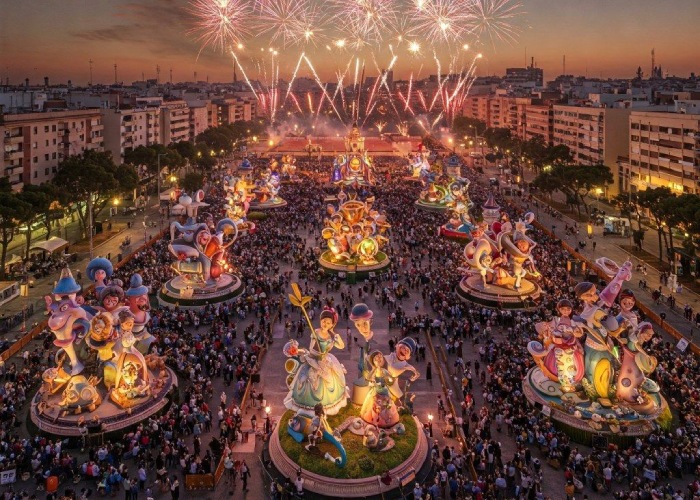This is the city where culture lives 365 days a year!
Located on Spain’s eastern coast, between the Mediterranean Sea and ancient traditions, Valencia is both modern and proud of its history.
Moving to Valencia means enjoying great weather, beaches, and an easygoing lifestyle but above all, it means entering a world where every day is a reason to celebrate and connect.
Here, culture isn’t confined to museums or monuments. It lives in the streets, in the music, in the Valencians’ good humor. Festivity has become a way of life a genuine way to strengthen bonds between neighbors, families, and generations.
The grand Fallas of March, the Holy Week processions, the summer festivals, and thousands of traditional dishes Valencia has so much to offer, both in festivities and in the warmth of its traditions. These moments of joy reveal the welcoming spirit of the region and help newcomers feel truly at home.
But Valencia’s soul goes beyond its sunny climate it’s found in the warmth of its people and their collective memory.
To know its festivals and culinary traditions before moving here is already to take your first step into the heart of the city.

Before unpacking your bags in Valencia, discover a city where every season is a celebration and every street pulses with tradition.
The Fallas: The Unmissable Event
You simply can’t talk about Valencia without mentioning Las Fallas, celebrated every March.
For several weeks, the entire city becomes an open-air museum: huge cardboard and wooden sculptures, called ninots, fill the streets before being burned in a spectacular finale.
Each neighborhood competes in creativity, locals parade in traditional costumes, and music echoes everywhere. It’s an artistic, popular, and cathartic celebration — a symbol of renewal.
Don’t miss:
-
La Mascletà — a traditional Valencian firecracker show focused on rhythmic explosions ending with a “sonic earthquake.”
-
La Cremà, on the night of March 19, when all the Fallas are burned.
Religious and Popular Festivals
Valencia also keeps a strong connection to its religious and folkloric traditions.
-
Semana Santa Marinera (Holy Week) in the Cabanyal district mixes solemn processions, historical costumes, and a maritime atmosphere.
-
La Virgen de los Desamparados, the patron saint of Valencia, is celebrated in May with flowers, dances, and a large offering in Plaza de la Virgen.
These festivities remind everyone of the deep bond between faith, community, and the city’s history.
Gastronomy and Togetherness: Traditions at the Table
Valencian celebrations always come with delicious food to share.
You can’t escape the famous paella, born here, the star of family meals and sunny Sundays. There’s also horchata, a sweet tiger nut drink often enjoyed with fartons.
During festivals, markets overflow with local oranges, tapas, and typical sweets like buñuelos de calabaza (pumpkin fritters).
Other fun events include Oktoberfest and the Pizza Festival in September, which attract big crowds.
Your weekends will never be empty the city’s full calendar of events ensures fun for everyone: locals, expats, and tourists alike.
Other Festivals You Shouldn’t Miss
Beyond the major celebrations, Valencia pulses all year long with other events:
-
La Feria de Julio, with fireworks and summer concerts.
-
La Tomatina, in Buñol (near Valencia), where thousands of participants throw tomatoes in good spirits.
-
Las Fiestas de San Juan, on June 23, with beach bonfires and midnight swims to bring good luck.
Every moment of the year is a chance to experience another side of Valencian culture.
Conclusion
Living in Valencia means embracing a rhythm filled with sharing and tradition.
These local celebrations are more than just events they are the very soul of a city rooted in its heritage, open to the world, and always ready to celebrate life.
